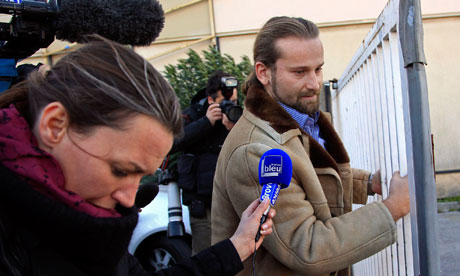
The breast implant health scare has taken a further twist with a claim the French company at the heart of the scandal also made implants for male patients.
Two former employees of Poly Implant Prothese said the firm manufactured testicle, buttock and chest implants, mainly destined for export, Le Parisien reported on Thursday.
"Three people were specially trained to work on the machine that made silicone testicles," a former PIP worker told the newspaper.
A second said: "It was an injection machine that had clearly cost a lot of money. It was bought in with the purpose of entering into different areas of the [implant] market.
"It was used during the last few years in the company. Most of what was produced was sent abroad."
The testicle implants were destined to be used for reconstruction in patients who had lost a testicle through cancer or amputation or had been born with only one.
The newspaper said it was not clear if silicone used in the testicle implants was sub-standard. But one of the former employees said the gel used in the buttock and chest implants, aimed at male patients, was the same as the industrial quality material used in the breast implants that, it is claimed, have a high risk of rupturing.
"For aesthetic reasons some of our clients, especially those in South America, ordered them and in that case the gel used to make them was the suspect gel that did not conform [to health standards] that was already used in the breast implants. It might cause health problems in certain patients," said the ex-PIP worker. He said false pectorals were aimed at men who felt they were "not very well-built".
In a separate report, leading French cancer treatment centres including the respected Marie Curie Institute were said to have been seduced by the low price of PIP breast implants for use in reconstructive surgery after mastectomies.
Le Figaro claimed 16 of the country's 18 leading cancer institutes used the PIP implants up to 2010. A plastic surgeon told the newspaper that hospital authorities in Paris preferred to keep the number of suppliers of medical devices to a minimum.
"For many years PIP was kept on as supplier to the three public cancer treatment centres in Paris and the banlieue," he said, adding that PIP prosthetics were also used "in surgery lessons or in demonstrations at conferences".
The French health agency AFSSAPS said: "In France the company did not declare anything other than the production of breast implants. But we are only aware of what was produced on national soil."
Yves Haddad, lawyer for Jean-Claude Mas, the founder and former head of PIP, said his client would not be making any comment over the latest allegations.
Mas's son, Nicolas Lucciardi, admitted the company had acted fraudulently but said the French government should not have ordered the 30,000 women in France fitted with PIP implants to have them removed.
"Everyone is jumping on us. We admit there was a fraud when PIP didn't declare the type of gel used in the fabrication of its implants," he said, adding that the company had "ceased all activity" in the field.
He described the French government's action as aberrant. "The minister gave in to the call of the public opinion sirens," he said. "Nobody has proved they cause cancer."
An investigation has been launched in France into charges of "manslaughter and unintentional injury" against PIP, which supplied 65 countries and was once the world's third largest manufacturer of breast implants.
On Wednesday local judge Annaïck Le Goff visited the former PIP headquarters at La Seyne-sur-Mer in the Var in Provence, south-east France, and left with an armful of files.
A parallel investigation has been opened into "aggravated deception".
So far 2,400 French women given PIP implants have lodged legal complaints.

